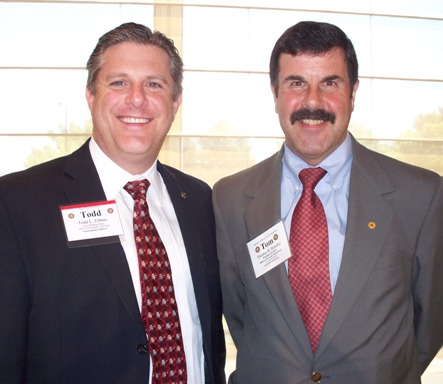JULY 23, 2013 ROTARY IN REVIEW:
The Press and Protected Information
Club 10 Business Report
President Jim Kosmo brought the meeting to order at 12:30 p.m. on a beautiful summer day in the Saintly City. Joe Kovarik led the assembled Rotarians in singing God Bless America accompanied by Bob Jones on the piano. Tom Brinsko provided today's invocation. Doug Bruce facilitated the introduction of visiting Rotarians and guests. Today's Greeters were Blake Davis and Christian Weinhagen. Table tents reminded everyone of the Saint Paul Rotary Blood Drive to be held on August 13th from 10 a.m. to 3 p.m. at the Crowne Plaza in Kellogg Suite 1. Call the Rotary office to register.
Rotarian birthdays for the month of July were recognized. Armando Camacho provided a reminder of the July 25th Rotary-After-Hours to be held from 5:30  to 7:30 at the Ordway Summer Dance in Rice Park. Tom Brinsko introduced new member Todd Tibbits, the chief operating officer of the Saint Paul YMCA. Doug Hartford informed the Club of the re-elected and newly elected members of the Board of the Saint Paul Rotary Foundation. Kathy Riley collected Happy Dollars. Sarah Kolar made a Happy Dollars contribution of note as outgoing sergeant-at-arms, honoring her successor, Kathy Riley.
to 7:30 at the Ordway Summer Dance in Rice Park. Tom Brinsko introduced new member Todd Tibbits, the chief operating officer of the Saint Paul YMCA. Doug Hartford informed the Club of the re-elected and newly elected members of the Board of the Saint Paul Rotary Foundation. Kathy Riley collected Happy Dollars. Sarah Kolar made a Happy Dollars contribution of note as outgoing sergeant-at-arms, honoring her successor, Kathy Riley.
The Hon. John Guthmann introduced today's speaker, Dave Pyle. Mr. Pyle was with the Associated Press for thirty-three years, most recently as Bureau Chief in Minnesota and Wisconsin. He left AP about eighteen months ago, so he was primarily offering his personal observations today. He addressed the recent case in which the National Security Agency secretly obtained phone records of the Associated Press to investigate how the AP knew about Al Qaeda operations in Yemen. The NSA felt that AP reporting about a foiled Al Qaeda plot had endangered a CIA operative in Yemen. The AP was concerned that the NSA'a actions were overbroad. As a result of cases like this, the Associated Press has set forth five principles intended to govern this relationship between the press and the government: (1) the Department of Justice needs to recognize the right of the pres to have advance notice of phone record requests; (2) there needs to be judicial oversight of the National Security Agency; (3) the Department of Justice needs to update its guidelines to reflect modern communications technologies such as the internet, Twitter, blogs, etc., (4) a federal shield law to protect reporters should be adopted, and (5) Attorney General Holder's statement that "we will not crimianlize" any reporter doing his/her job should become government policy. The challenge becomes determining who is a reporter and what constitutes this press in this new era of communications.
Mr. Pyle noted: "Beware the government that loves secrecy too much." The Obama administration has prosecuted seven government "leakers" under a World War I anti-espionage law. This is more than any prior administration. This may prove the need for a federal shield law to protect reporters and their sources to ensure a free press. Despite these concerns, however, Mr. Pyle noted that compared to press environments in other countries, freedom of the press is still the best in the world in the United States.
President Jim thanked Mr. Pyle for his remarks and noted that a donation in his name would be made to the Saint Paul Public Library's "Read With Me" program. He also awarded Mr. Pyle with an official Rotary coin featuirng the Four-Way Test. He then adjourned the meeting at 1:31 p.m.
Chuck Standfuss, Scribe

